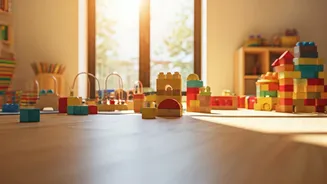Unplug and Play
In today’s fast-paced digital world, it can be easy for children to spend excessive time with electronic devices. The first idea advocates for a 'digital
detox family day.' To execute this, parents should coordinate with their children to turn off all electronic devices, including phones, tablets, and gaming consoles, for the day. This provides an opportunity for family members to reconnect through face-to-face interaction and other forms of engagement. This concept focuses on enjoying the present and encourages family members to participate in activities that promote their mental and physical well-being. Consider playing board games, reading books, and engaging in outdoor activities such as playing in the park or going for a walk.
Creative Time Capsules
Building a family time capsule is an excellent way to capture the memories of a moment in time and to create something to be treasured for years to come. Start by gathering a durable container, such as a box or a jar. Ask each family member to contribute items that represent them. These could include photographs, artwork, letters, small toys, or any other items that have special significance. Next, decide on a date to open the time capsule, perhaps in 5 or 10 years, or on a special occasion, like the child's 18th birthday. Store the capsule in a safe and dry place. Once it's opened, you'll have a unique opportunity to reminisce, laugh, and celebrate how much you've all grown and changed over time.
Artistic Adventures
Encouraging artistic expression is crucial for children's overall development. Designating Children’s Day as a day for an art-themed celebration is a great idea. There are several creative activities to consider, such as a painting session, where you can provide various art supplies like paints, brushes, canvases, and different types of paper to the children. Let them paint whatever their imagination conjures. Alternatively, you could organize a craft session, where children can get hands-on with materials to create unique crafts. You could provide items such as construction paper, glue, glitter, and other craft tools. Encourage them to explore their creativity with these items, and let them create whatever their imagination inspires them to make. To conclude the activities, organize a family art gallery and showcase all their creations.
Culinary Creations
Cooking together provides an opportunity for children to develop important life skills and promote family bonding. Plan a cooking session where the family can jointly prepare simple, child-friendly recipes. Selecting recipes that are safe and easy for children to participate in is key. Consider baking cookies, making pizzas, or preparing healthy snacks like fruit skewers or veggie sticks with hummus. Engage the children in every step of the process, from measuring ingredients to mixing and decorating the final product. Teach them the basics of food safety and hygiene, like washing hands before starting and handling utensils with care. This can create a fun environment while also fostering a healthy relationship with food and a sense of responsibility.
Talent Show Extravaganza
A parent-child talent show is a fantastic way to boost children's self-esteem and give them the confidence to perform. Begin by letting your children pick what kind of talent they want to present. This might include singing, dancing, playing musical instruments, performing magic tricks, or reciting poems. Next, assist them with preparing and practicing their performances, providing guidance, and encouragement along the way. Create a festive atmosphere on the day of the show by setting up a stage area with decorations, lighting, and music. Encourage the children to dress up and embrace their roles. Lastly, invite relatives and friends to watch the show and provide encouragement.
Outdoor Exploration
Nature can be an incredibly rewarding environment for children, so consider planning outdoor activities. Organizing a scavenger hunt is a fun way to stimulate children's problem-solving skills and keep them entertained. Prepare a list of items to find in the park or garden, such as specific types of leaves, rocks, or flowers. Alternatively, create a nature walk, where you and your children explore a nearby park or forest. As you stroll, point out different plants, trees, birds, and other animals. Encourage your children to ask questions and learn more about the natural world around them. Outdoor activities provide a great opportunity for physical activity and learning.
Storytelling and Games
Storytelling and games can stimulate a child's imagination while also promoting family interaction. Organize a family storytelling session, where each family member contributes to the story. Start with one person initiating the story, then pass it on to others to add a sentence or paragraph. This creates a collaborative narrative that keeps everyone engaged. Alternatively, create a board game afternoon. There are a variety of board games suitable for different age groups, such as Scrabble, Monopoly, or simple card games. These games help children learn and develop critical thinking abilities. Family game time provides an excellent opportunity for laughter, fun, and bonding, and it will help create lasting memories.













